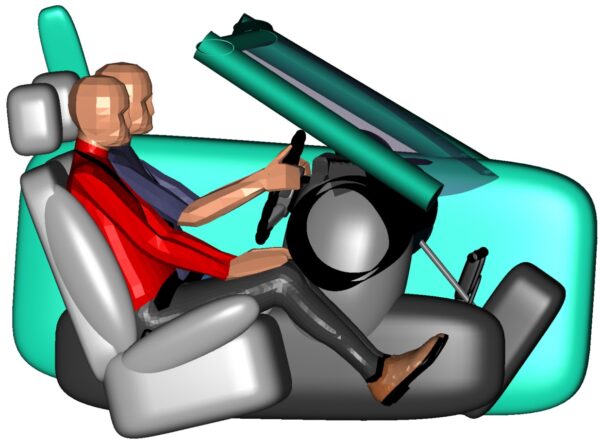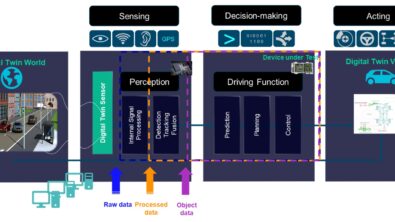Simcenter Madymo 2021.1 – Scaling goes global


The problem today:
Crash tests were first introduced in 1947. Since this time human body proportions have changed significantly. The fiftieth percentile male in the ’40s would not be the average male of today. Much of the early data recorded was taken in North America and often from military personnel, giving a significant bias to a sub-group of the total population. For the development of vehicle safety systems, car manufacturers are looking for humans’ ideal representation, but this is complicated by the differences between populations. The world’s tallest men are the Dutch, who at 19-years of age are 183.8 cm tall, on average. Timor-Leste has the shortest population of males with an average height of 160.1 cm. In fact, the average Timor-Leste male is 10.3 cm shorter than the average Dutch female (The Lancet). Since such differences in size could impact the effectiveness of car manufacturers’ safety systems, they may wish to test with their target population in mind. To do this, they will need to consider the large variability between different individuals. With Simcenter Madymo 2021.1 their problem is solved.

What is Tecnomatix Jack?
NASA first used Tecnomatix Jack [Jack] as an ergonomic assessment and virtual human prototyping system. Jack now provides human-centered design tools to perform ergonomic analysis of virtual products and virtual environments. With Jack, you can test your designs for multiple factors such as user comfort, reachability, line of sight, energy expenditure, fatigue limits, and other important human factors. Jack enables you to integrate human factors and ergonomics into the planning, design, and validation stages of the product lifecycle seamlessly.

New possibilities
On their own, both Madymo and Jack can help you design a car, boat, plane, and many other environments. Madymo is commonly used to improve safety systems such as airbags, seat belts, or the required height of a safety rail. Jack ensures that the driver or operator can reach all the needed controls comfortably. Development processes require a range of human and dummy models to ensure that they are suitable for all desired populations. Small changes in human size and shape can have a drastic effect on the required safety and comfort design. To ensure the best designs, it is in a designer’s interest to have anthropometric models that are the same size in both Jack and Madymo. With the release of Simcenter Madymo 2021.1 we introduce a scaling tool with the inclusion of all Jack’s databases. This means that it is possible to quickly generate both a Madymo and a Jack model scaled using the same databases.
The Jack updates
Tecnomatix Jack can scale anthropometrically accurate human models to sizes correct for numerous populations. Until now, Madymo was only able to do this for one population. This new integration of packages allows Madymo users to scale the dummy and scalable human models with 12 population databases. In the past, you could use the GEBOD scaling tool to scale your model using a data set taken from the US air force. With the inclusion of Jack scaling in Madymo, it is now possible to scale to Chinese, German, Korean, Japanese and seven other populations.
The new scaling tool
The new scaling tool not only allows you to scale with more population databases. It also makes scaling user friendly. No longer is the user required to remember the correct command line input. The new scaling tool takes away the need to make modifications before and after the model is scaled, such as changing the shoe’s mass. The whole scaling process is now possible with just a few clicks of the mouse. Furthermore, the scaling tools in Madymo and Jack generate comparable models.
RESTART functionality gets Prescribed Structural Motion (PSM)
To find solutions quickly the safety system engineer will often run as many simulations as possible in co-simulation. In addition to co-simulation, they will try to split the tests up into clear sections to allow them to run shorter sections of the simulation, and thus save simulation time. To find the best result, the safety engineer will combine two software packages allowing them to leverage the benefits of both packages in a coupled simulation.
Last year the Madymo team released RESTART. RESTART is the new functionality that allows you to resume a simulation from where a previous simulation had stopped. This is useful when you have a simulation with two distinct events, such as, pre-crash and in-crash, or an avoidance maneuver followed by an impact. With RESTART you can run the pre-crash simulation once and use its results to start numerous in-crash simulations. This is often done to tune your safety systems, i.e. the firing time of the airbag.
In the new release, RESTART has been updated to include PSM in co-simulation. This means that finite element data that describes the motion of the finite element surface, can be used in both a single RESTART simulation and in multiple simulations that are being simulated simultaneously.
Other updates in this release

Forte v4 – This release provides yet more flexibility for the user when defining the motion of the vehicle.
Previously, the motion of the vehicle could be prescribed using only the vehicle position coordinates. In this release, we have introduced a new functionality that allows the user to also define the vehicle motion with acceleration data.
Hybrid III 5th ell v2.2 – The abdomen response update gives an improved response to impacts. Simulations show that when multiple impactors are applied to the dummy, the abdomen will perform in an improved anthropometrically realistic way.
P Dummy – A full review of the P dummies has resulted in numerous updates to improve the appearance, response, and consistency across the family of models. All the models were updated together to align them and improve the model family’s user-friendliness. Additional stress-based characteristic have been defined in the user file to improve the interaction between the dummy and FE elements.
Standing Hybrid III 50th ell v3.4 – Updated neck and abdomen contact definition improve the model’s robustness. This update improves the stability and robustness of the model when it contacts a FE ground surface. Additional Internal contacts provide a more biofidelic motion and ensure stability. The ankle joint has been updated with a bottoming out characteristic to prevent gimbal lock.
TB024 AF05 v1.1- Damping coefficient for upper leg contact characteristic has been improved to prevent high-frequency oscillations in contact force results.
TB024 family – Names and outputs of leg fracture switches are added to ensure it is easy to identify when a fracture has occurred. This allows the user to quickly transfer results to the Euro ENCAP datasheets for reporting of the vehicle tests.
Euro NCAP TB024 v2.0 application – New Radioss coupling files that run with Radioss Generic Vehicles version 2.2 are now available.
For more information about Simcenter Madymo contact us or visit the Simcenter Madymo webpage.


